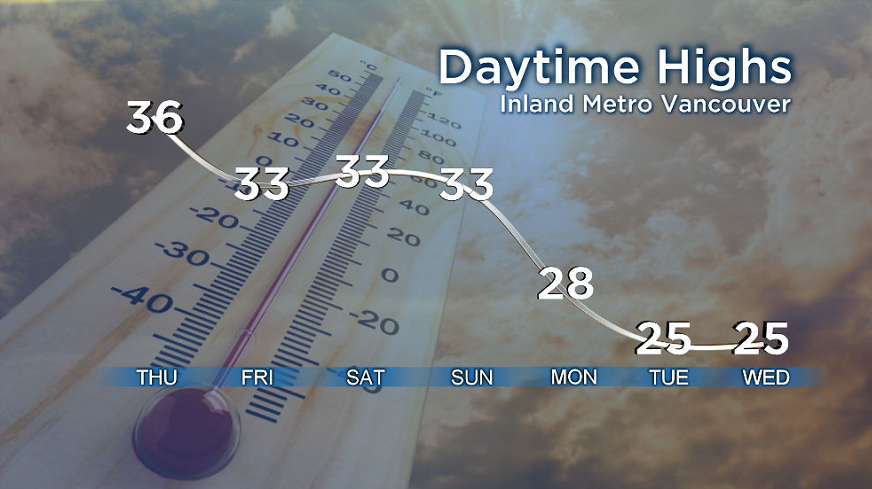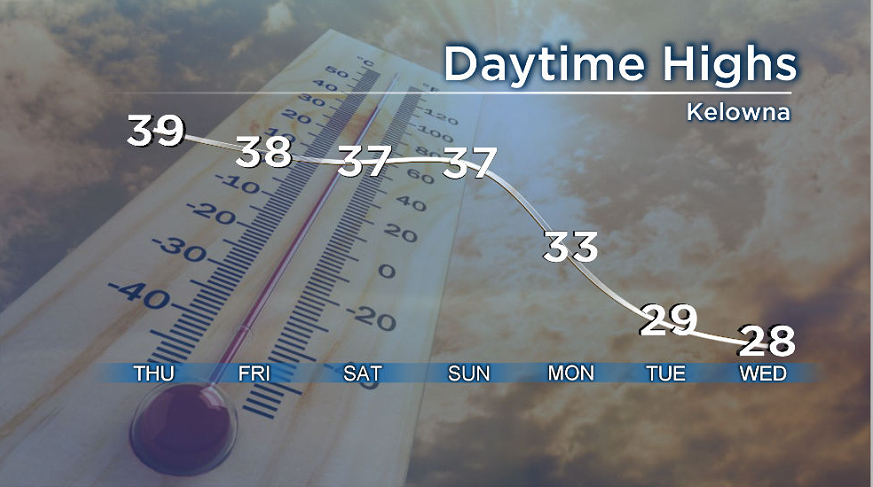Fourteen temperature records across B.C. were broken Tuesday as a ridge of high pressure rolled in.

While most of the daily temperature records were broken by one to two degrees Celcius, some areas were significantly hotter than usual, according to the data from Environment Canada.
The July 26 heat record in Squamish, for example, is now 37.1 C, breaking the previous record of 31.6 C set in 2018 by nearly six degrees.

In Sechelt, temperatures reached 34.4 C, breaking an old record of 30.3 C set in 2018. Below is the full list of records broken so far. It could expand in the days to come as forecast temperatures reach higher.
Environment Canada has reissued a heat warning that covers the Fraser Canyon, South Thompson, Nicola, Similkameen, Okanagan Valley, Shuswap, Boundary, Greater Victoria, Howe Sound, Metro Vancouver, and Fraser Valley.
READ MORE: A year after deadly B.C. heat dome, experts say events may alter ecology forever
The aforementioned regions in the Southern Interior are facing daytime high temperatures ranging from 35 to 41 C, with early morning low temperatures of 18 to 21 C between now and Sunday. The temperature is poised to start dropping as of Thursday and will eventually fall to 28 C this time next week.
Lower Mainland and Island residents should expect to see temperatures in the area of 31 to 38 C. On Thursday the high temperature is forecast to be 36 C before it drops a few degrees throughout the weekend and by next Wednesday the temperature is forecast to be around 25C.
READ MORE: Review into B.C.’s 2021 heat-related deaths calls for more coordinated response
The risks posed by extreme heat are more significant for young children, pregnant women, older adults, people with chronic illnesses and people working or exercising outdoors. Some of the effects of heat illness include swelling, rash, cramps, fainting, heat exhaustion, heat stroke and the worsening of some health conditions.
Last week, the province’s public safety minister, Mike Farnworth, said a new warning system is ready to go with new protocols on how to issue heat alerts.
The protocol lays out the daytime maximum and nighttime minimum temperatures that would trigger the heat bulletins.
If a region is expected to exceed those ranges for two consecutive days it will trigger a heat alert, while if it is expected to last three or more days it will trigger a heat emergency, Farnworth said.
The public is also being urged to visit the province’s PreparedBC website for more resources on how to manage extreme heat.
Temperatures rose to a peak of more than 40 C in many parts of the province.
In its report, the BC Coroners Service said it investigated more than 800 deaths during the week of June 25 to July 1, 2021, and later found 619 to have been heat-related.
Heat Records in B.C.
- In the Abbotsford area, the mercury reached 35.4 C, breaking a record of 33.6 C set in 1998.
- In Agassiz, a new record of 36.5 C was set, breaking the old record of 35.6 C made in 1899.
- Bella Bella set a new record of 33.6 C, breaking a 2009 record of 27.3 C.
- Estevan Point set a new record of 23.8 C, breaking a 1998 record of 22.5 C.
- In the Gibsons area, the temperature of 34.4 C broke an old record of 30.3 C set in 2018.
- In Hope, a new record of 37.9 C was set. The previous record was 36.1 C set in 1958.
- In Malahat, the temperature reached 33.2 C. compared with 30.5 C, the record set in 1996.
- Port Alberni saw a high temperature of 37.7 C, which broke a record of 36.7 C set in 1971.
- The Prince Rupert area set a preliminary record of 25.8 C on Tuesday, surpassing the 24.1 C record from 1998.
- In the Victoria area, the new record is now 31.5 C, compared with 30.5 C, which was set in 2019.
- White Rock also saw a daytime record with the temperature reaching 31 C compared with 29.4 C recorded in 1958.






Comments